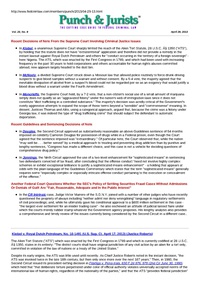Loaded on
April 29, 2013
published in Punch and Jurists
April 29, 2013
Here the Court approved a two-level enhancement for “sophisticated means” in a tax fraud case, after concluding that the offense conduct “need not involve highly complex schemes or exhibit exceptional brilliance" to justify the enhancement.
This is another of a string of recent rulings that suggests it doesn’t …
Loaded on
April 29, 2013
published in Punch and Jurists
April 29, 2013
By a 7-2 vote, the Supreme Court extended a small degree of leniency (and a large dose of rationality) to the U.S. immigration laws by holding that non-citizens living legally in the U.S. who get convicted in a state court for ”social sharing of a small amount of marijuana,” …
Loaded on
April 29, 2013
published in Punch and Jurists
April 29, 2013
uThe Alien Tort Statute (“ATS”) which was enacted by the First Congress in 1789 and which is currently codified at 28 U.S.C. § 1350, states in its entirety: "The district courts shall have original jurisdiction of any civil action by an alien for a tort only, committed in violation …
Loaded on
April 29, 2013
published in Punch and Jurists
April 29, 2013
In this case, the Court was called upon to assess the substantive reasonableness of an above-Guidelines, add-on sentence of 54 months imposed on Cameron Douglas (the son of Hollywood actor Michael Douglas), who pled guilty to possession of drugs while an inmate of a Federal prison, in violation of …
Loaded on
April 29, 2013
published in Punch and Jurists
April 29, 2013
In this case, a divided Supreme Court struck down a Missouri law that allowed police routinely to force drunk-driving suspects to give blood samples without a warrant and without consent. By a 5-4 vote, and in a decision that was tightly limited by the question presented to the Court, …
Loaded on
April 29, 2013
published in Punch and Jurists
April 29, 2013
On October 19, 2011, the U.S. Securities and Exchange Commission (“SEC”) filed a lawsuit against Citigroup Global Markets, Inc. (“Citigroup”) charging it with “a substantial securities fraud” arising out its sale of mortgage-backed securities in the year 2007. Simultaneously with the filing of its Complaint against Citigroup, the SEC …
